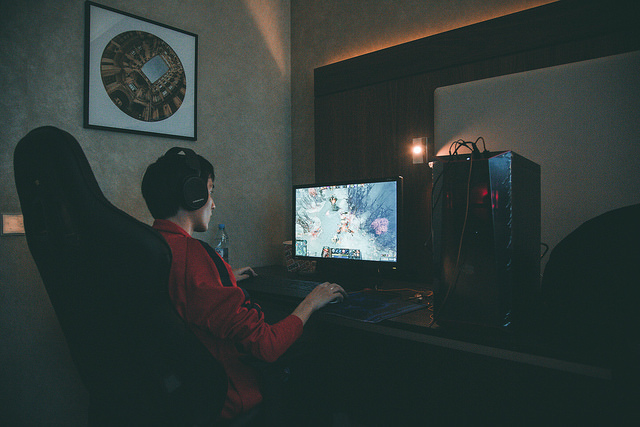The rise of esports
November 6, 2018
The days of casually gaming with buddies has evolved into a multimillion-dollar industry that encompasses all ages and reaches far beyond a stereotyped demographic—and it’s only the beginning.
Esports is, by definition, “a multiplayer video game played competitively for spectators, typically by professional gamers” but to someone unfamiliar with the term, or its community, it’s just people playing video games.
The 2017, “League of Legends Championship” peaked at 106.2 million viewers with 98 percent of them being from China, which is equal to how many people tuned in for the 2018 Super Bowl.
People are engaging in video games and the industry is predicted to grow 22 percent according to a 2018 Business Insider market review— annually-this could reach $1 billion in the next three years.
In comparison to mainstream sports viewing- esports appears to be holding its own and in some cases even out doing some of the biggest events in live sports. These are all individual leagues unlike the NFL or MLB which have their one league for their sport. For example, the international DOTA 2 championship had a prize pool of over $25 million beating out such events as the Daytona 500, the 2018 U.S. Open and the 2018 Tour de France.
The 2017, “League of Legends Championship” peaked at 106.2 million viewers with 98 percent of them being from China which is equal to how many people tuned in for the 2018 Super Bowl.
“While it remains to be seen whether competitive gaming will ever be bigger than the NFL in revenue, the two are running neck-and-neck on a potentially even more important metric: popularity among younger fans. The Post poll found that 38 percent of young Americans identified as fans of esports or competitive gaming, similar to the 40 percent who said they were fans of the NFL” wrote Christopher Ingraham The Washington Post.
Seeing how esports has grown exponentially nevalleynews.org spoke with two individuals about the possibility of esports becoming a career choice norm.
Bryan Asaba is an aspiring Twitch streamer and video game enthusiast who has visited events in the past and is currently studying for his Bachelor of Science for Gaming Design. When asked about the possibility of gaming becoming a career opportunity he addressed the Twitch influence.
“Nowadays it’s becoming more of a career for people who are entertainers or pro gamers that kind of stuff with the help of Twitch,” Asaba said.
Allison Encinas has very little video game experience but has visited an event. She is currently a Product Fulfilment Associate at a financial software company and full-time student at Arizona State University for Organizational Leadership.
Encinas sees the business opportunity behind the scenes of esports more of a career path than the pursuit of a professional gamer.
“Possibly there is a chance, but would it be my first choice as a parent? No, technically no security. There might be security going into the other aspects of the industry, like the behind the scenes, journalism, marketing, business aspect, or tech behind it, but there’s less security as a professional gamer,” Eninas said.
Much of the data on esports from the Washington Post and the other business sources indicate that esports has a bright future.
Both Asaba and Encinas addressed the possibility that esports could one day garner the kind of attention that the major league sports franchises capture now.
“Yes, because I believe there is more people who enjoy video games more than sports nowadays. Video games is pretty much worldwide, not like football which is mostly popular in America,” Asaba said.
“When you’re thinking about the kids who are really engaged now, you have like 8-10 year olds enjoying esports. In 20 years, they will be adults and we know that they will push it on their kids and expose them to the same type of gaming so it’ll probably start to grow then. It kind of has to cycle up, it’ll trickle down and as it keeps trickling and keeps on passing on this information it’ll become more and more of the norm to watch it” Encinas said.
If the growth trend continues, esports could become a mainstream sport in the next decade or two.


